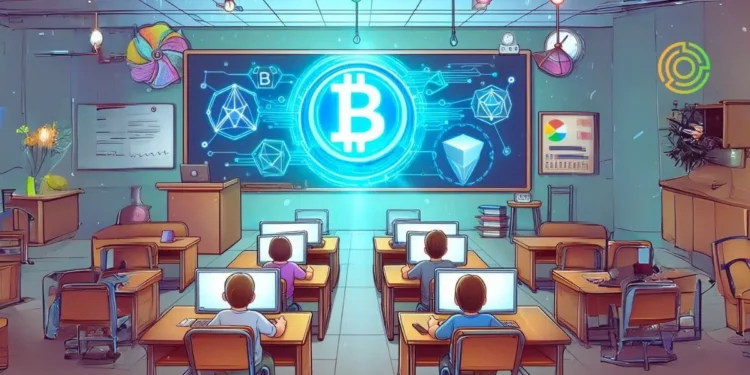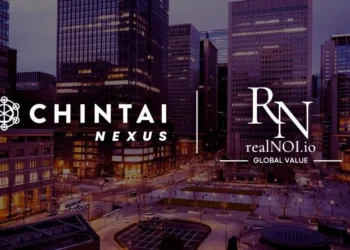The landscape of education is evolving rapidly, and at the forefront of this transformation is the revolutionary potential of Blockchain technology. In this article, we delve into the profound impact that Blockchain can have on the education sector, exploring its capabilities, applications, and the challenges it faces.
The Transformative Potential of Blockchain in Education
Secure and Transparent Academic Records
Blockchain’s immutable ledger technology presents an unprecedented opportunity to revolutionize the education sector. It offers a secure, transparent, and tamper-proof platform for storing and sharing academic records. In an era where traditional classrooms have transitioned to virtual learning, and the pandemic has accelerated the adoption of online platforms, Blockchain emerges as a game-changer.
The immutable nature of Blockchain facilitates the verification of academic records, diplomas, and exam scores. Additionally, experts suggest the implementation of smart contracts for agreements on assignment deadlines and exams, benefiting teachers, university administrators, and students alike.
Smart Contracts and Certification of Degrees
Streamlining Course Management
Smart contracts, embedded in Blockchain solutions, offer a streamlined approach to course management. These contracts, stored on the Blockchain, can automate the distribution of course materials, track student progress, and manage task completion. This not only reduces administrative burdens but enhances the overall organization of courses within the education sector.
In addressing the rising concern of fake degrees and certificates, Blockchain becomes a robust solution. By storing certificates as immutable data blocks, universities can eliminate the risk of counterfeit credentials. Students can easily share these credentials using Blockchain, ensuring authenticity through their addresses, social profiles, and resumes.
Cryptocurrency Rewards and Tuition Payments
Innovations in Educational Finance
Blockchain also addresses the complexities of document transfer and verification when students change schools. Its interoperable network streamlines the verification process in schools and universities. Moreover, a potential future scenario involves academic institutions incentivizing timely student loan payments and teachers rewarding high-performing students with cryptocurrencies.
The gamification aspect of education through tokenization could significantly benefit the education sector. Platforms like BitDegree utilize Blockchain and tokenization to offer free and paid online courses, incentivizing learning by providing tokenized scholarships for course completion and achievements.
Additionally, some institutions, like the King’s College in New York, have embraced cryptocurrency payments, signaling a potential shift towards cryptocurrencies as a method of tuition payment.
Certification of Grades and Cost Reduction
Enhancing Transparency and Accountability
Blockchain has the capacity to enhance transparency and accountability in education. By creating an immutable record of educational data, including academic records, employers can trust the skills and knowledge of job applicants. The technology also simplifies the often time-consuming process of transferring documents when students switch schools.
Beyond transparency, Blockchain can significantly reduce administrative costs in education. Processes that traditionally require substantial time and manual effort can be automated through Blockchain implementation. This, in turn, may lead to reduced operational costs for educational institutions, potentially translating into more affordable tuition for students.
Moreover, Blockchain can facilitate widespread access to free educational resources. Public domain teaching materials, such as books, podcasts, and educational videos, can be easily accessed and redistributed through Blockchain, contributing to a more inclusive and accessible education system.
Challenges in Adopting Blockchain in Education
Despite the myriad benefits, the adoption of Blockchain in education faces significant challenges. A 2019 Gartner survey revealed that 50% of higher education respondents expressed disinterest in Blockchain, with only 2% having adopted it. Security concerns, compliance with data protection laws, scalability issues, and associated costs are among the primary hurdles.
Security, while a core feature of Blockchain, does not guarantee invulnerability. Meeting state and federal data protection laws poses challenges, and concerns about the technology being in a developmental stage contribute to hesitancy among educational institutions.
Scalability is another issue, especially considering the vast amounts of student data held by educational institutions. As adoption increases, the number of blocks required on the Blockchain may slow down transaction speeds.
Despite potential cost savings in the long run, the initial investment and the need for specialized knowledge hinder widespread adoption. Many institutions lack the expertise needed to manage student data on a Blockchain platform, necessitating investment in training programs.
See also: Cryptocurrencies and Sustainability: Trends for 2024
Embracing the Future: Blockchain in Education
In conclusion, while challenges persist, it is undeniable that cryptocurrencies, Blockchain, and emerging Metaverse initiatives are reshaping our world. Integrating Blockchain into education not only opens doors for the younger generation but also establishes an effective framework that serves all strata of society, making learning an enriching journey.
FAQs
What is Blockchain’s role in education?
Blockchain revolutionizes education by providing a secure, transparent, and tamper-proof platform for storing and sharing academic records. It has the potential to streamline administrative processes, enhance transparency, and transform the way educational credentials are managed.
How does Blockchain enhance security in education?
The immutable nature of Blockchain ensures the security of academic records, diplomas, and exam scores. It creates a tamper-proof system that reduces the risk of counterfeit degrees and certificates, addressing concerns related to document authentication.
What are smart contracts, and how do they benefit education?
Smart contracts are self-executing contracts with coded terms. In education, they can automate tasks such as course material distribution, progress tracking, and assignment completion. This technology reduces administrative workload and improves overall course organization.
Can Blockchain be used for certification of degrees and credentials?
Yes, Blockchain is an effective solution for certifying degrees and credentials. By storing certificates as immutable data blocks, universities can eliminate the risk of fake certifications. Students can easily share their credentials, enhancing trust in their qualifications.
Are there any financial innovations in education related to Blockchain?
Blockchain introduces financial innovations in education, such as using cryptocurrencies for tuition payments and incentivizing students with crypto rewards. This can potentially simplify financial transactions and create new motivational structures within the education sector.
How does Blockchain address the issue of document transfer in education?
Blockchain’s interoperable network streamlines document transfer and verification when students change schools. It offers a decentralized and efficient solution to the complexities associated with document transfer, saving time for students, teachers, and administrative staff.
What role does gamification play in education through Blockchain?
Gamification in education, facilitated by Blockchain and tokenization, introduces incentives for students. Platforms like BitDegree offer tokenized scholarships for completing courses and achieving specific milestones, making the learning process more engaging.
Can Blockchain reduce administrative costs in education?
Yes, Blockchain has the potential to automate time-consuming processes in education, leading to reduced administrative costs for institutions. Tasks such as document verification, data transfer, and course management can be streamlined, contributing to cost efficiency.
What challenges does Blockchain face in adoption within the education sector?
Challenges include security concerns, compliance with data protection laws, scalability issues, and initial implementation costs. Many educational institutions express hesitancy due to the perceived risks and lack of expertise in managing Blockchain technology.
Is Blockchain already widely adopted in education?
Despite its potential, Blockchain adoption in education remains relatively limited. A Gartner survey in 2019 indicated that only 2% of higher education respondents had adopted Blockchain, with 50% expressing disinterest. Overcoming challenges is crucial for widespread adoption.
Follow us on our social networks and keep up to date with everything that happens in the Metaverse!
Twitter Linkedin Facebook Telegram Instagram Google News Amazon Store
Recent Posts
- RealNOI partners with Chintai to launch $124M Tokenized Real Estate Cash Flow platform
- Promeet Raises $3.1M in Pre-Seed funding to transform Creator Monetization
- Bitcoin’s Future: Could Trump’s Return Push It to $800,000 by 2025?
- Trust Wallet Trusts in Arena Games: Leading the way in Web3 Gaming
- Leading Web3 Game Pixels expands Token utility, reputation system, and IP with the launch of Pixel Dungeon











































